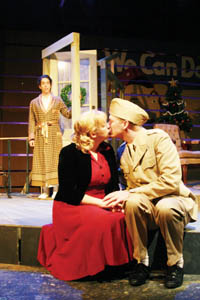![[Metroactive Stage]](/stage/gifs/stage468.gif)
[ Stage Index | Silicon Valley | Metroactive Home | Archives ]
A Word To the Wise
Four women struggle with World War II emotions and relations in City Lights' 'Wise Women'
By Marianne Messina
SET JUST before Christmas and serenaded between scenes by Bing Crosby and other '40s holiday favorites, City Lights' production of Wise Women easily plucks the holiday heart strings. (Why is it World War II always plays like such a quaint little war these days?) In Ron Osborne's play, two girls—Jiggs and Sarah Ruth—who have traveled from afar to work at a munitions factory in Knoxville move in (for $10 a month!) with single mom Florence (Rachel Bakker) and her 17-year-old daughter Rose (Samantha Harris Bartholomew). All three women have secrets hidden in their histories, and amid this crew of grin and bearers, Mom attempts to keep Rose out of boy-trouble.
Wise Women starts out funny and settles into comfortably amusing with occasional ironic breaches, and from time to time characters outreach themselves in search of humor as if from a tacit wish for the ironic to be comic and the amusing to be hilarious. But eventually the actors' instincts win out and characters become seated.
Shannon Stowe gives Jiggs a charming edge as the flirtatious self-starter, motivational coach to Sarah Ruth (Robyn Winslow). Winslow settles delightfully into her role as would-be pageant beauty, masking her private sadness with grace. As the single mom, Bakker does controlled and dour so well that her shifts to warmth/understanding take you by surprise—as if seeing her through the eyes of her daughter. Donnie (Jack Starr) never really gets the chance to come out of caricature as the randy player/soldier boy whom Jiggs entertains; on the other hand, Jeff Clarke, as Howard, manages to bring a convincing romantic lead through in a short time.
Set designer Ron Gasparinetti has created a homey couch/piano/ironing-board living room flanked by a curious wall made of barn-style wide boards with slits between the slats. On it is a painted sign saying "We can do it!" and, as red or blue lighting shows through the slats, it's either a painted barn wall or open blinds looking out on a billboard, making it a fun, adventurous design.
In the second half of the show, director Kit Wilder ramps up the intimacy by strategically placing scenes right in our faces, bringing the production to full power. When Jiggs, who seems far from the nurturing type, becomes an empathetic ear for Sara Ruth, the two sit side by side off the front edge of the platform stage, about four feet from the audience, in a lovely exchange tuned to perfection. A bit later, Rose sits with her newly found soldier boy Howard, similarly facing the audience. Bartholomew and Clarke run with it to create a touching young earnestness for Rose's first-time sitting alone with a boy. Osborne chooses to keep the women's workplace in the background, as joke fodder ("I want my kids to know I helped kill lots of Nazis"), throwing the focus on women's "real" work—men of course. But it's not so much a play about empowerment as about coping. And not just women coping with men, but people coping with the undesirable parts of their worlds, probably the same mechanism that makes the mythology behind Christmas so enduring.
[ Silicon Valley | Metroactive Home | Archives ]
Copyright © 2005 Metro Publishing Inc. Metroactive is affiliated with the Boulevards Network.
For more information about the San Jose/Silicon Valley area, visit sanjose.com.
![]()

Kiss and Tell: Rachel Bakker (left), Samantha Harris Bartholomew and Jeff Clarke deal with the war at home in 'Wise Women.'
Wise Women, a City Lights Theater Company presentation, plays Thursday-Saturday at 8pm and Sundays at 2 and/or 7pm through Dec. 18 at City Lights, 529 S. Second St., San Jose. Tickets are $20-$35. (408.295.4200)
Send a letter to the editor about this story to letters@metronews.com.
From the November 23-29, 2005 issue of Metro, Silicon Valley's Weekly Newspaper.